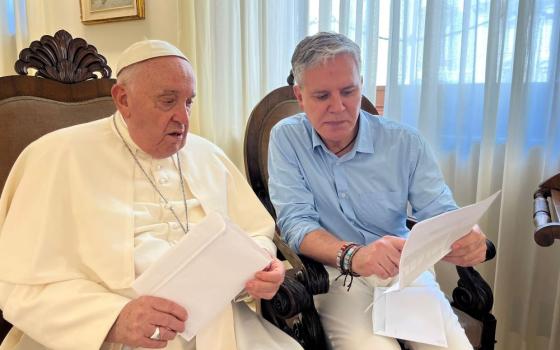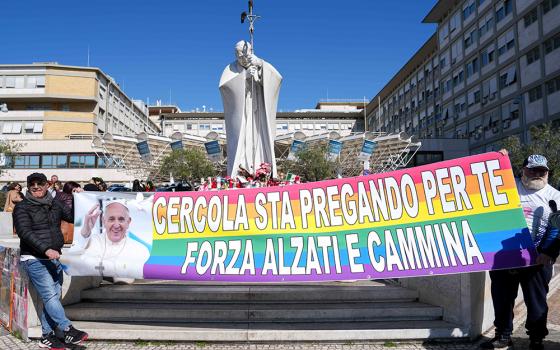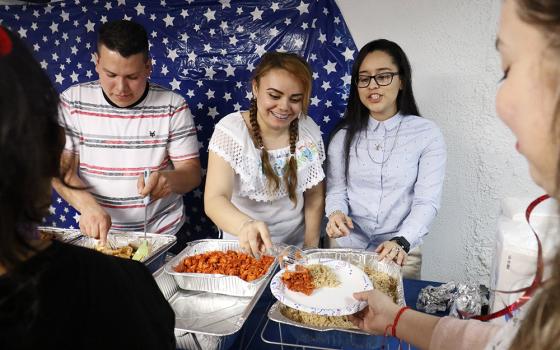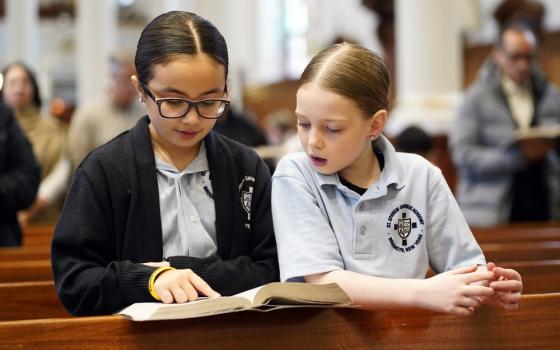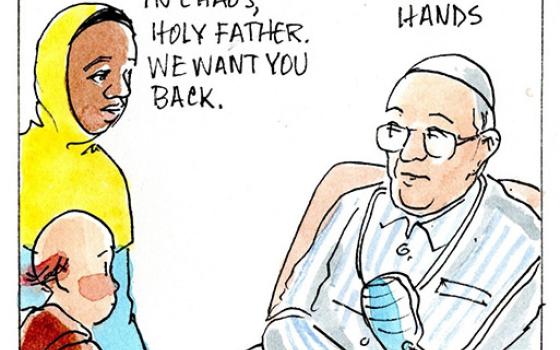
Amazon Frontlines co-founders (front row, center) Mitch Anderson and Nemonte Nenquimo, with partners from the Indigenous organization Ceibo Alliance (Courtesy of Amazon Frontlines)
Amazon Frontlines, an Indigenous-led organization committed to conservation and the protection of land rights and biodiversity in the Amazon region, will receive this year's Conrad N. Hilton Humanitarian Prize.
In announcing the honor — the world's largest annual humanitarian prize at $2.5 million — on Aug. 13, the Conrad N. Hilton Foundation noted that Amazon Frontlines is "the first organization of Indigenous and Western human rights and climate activists to receive the Prize."
The announcement noted that Amazon Frontlines has focused "on permanently protecting the rainforest homelands of dozens of Indigenous nations from further mining, drilling, and deforestation using grassroots organizing, advocacy, legal defense, and cutting-edge technology like GPS mapping and drone and camera trap surveillance."
In doing so, the organization has partnered with Indigenous peoples to win what the foundation said are some of the most significant climate victories in recent times, including the A'i Cofán and Waorani people's victories in "protecting hundreds of thousands of acres of rainforest and establishing legal precedents for Indigenous rights in the Amazon," the announcement said.
Hilton said the Amazon Frontlines, which primarily works in the Amazon region of Ecuador, Peru and Colombia, was also responsible for organizing a nationwide coalition that won a 2023 referendum to indefinitely stop oil drilling in Ecuador's Yasuni National Park.
That victory was notable, the foundation said, because the affected area is one of the most biodiverse territories on the planet and is home to two of the world's last uncontacted Indigenous populations.
In a statement, Nemonte Nenquimo, co-founder of Amazon Frontlines, said that the organization's work in the Amazon "is an urgent fight for the futures of all people, and for the Earth itself. We strive for a different future — where the global community deeply understands the land, the forest, and the ecosystem, and how it is providing life to all of us, and how interconnected all of us are across the globe."
Advertisement
Nenquimo added: "The Prize is a recognition of that work, and an acknowledgement that without the Amazon, there is no future. My life, the lives of my family and people, our homes, our culture, our language, the lives of myriad plant and animal species — many of which are endemic to the Amazon, the life of the forest itself, and the lives of millions of people all depend on it."
Mitch Anderson, executive director and co-founder of Amazon Frontlines, hailed what he said is the "the power of collaboration between Indigenous peoples protecting their lands against destruction and Western activists committed to listening, learning, and partnering to secure lasting preservation of our rainforests."
He added: "Time is running out to avoid a climate catastrophe, but Indigenous peoples hold the solutions and wisdom needed to solve this climate crisis. The Hilton Humanitarian Prize is a bolt of energy to our movement when the world needs it most."
In an accompanying statement, Peter Laugharn, the president and CEO of the Conrad N. Hilton Foundation, said that the selection of Amazon Frontlines "highlights the critical role Indigenous communities have in developing policies to protect the environment."
"For more than a decade," he said, "Amazon Frontlines has worked hand-in-hand with Indigenous leaders to develop proven, scalable, and sustainable models of locally led conservation — approaches that are vital to protecting the Amazon and therefore our entire planet."
The winner of the prize is selected by a jury from submissions by nonprofit groups throughout the world. Among those on the jury was Sr. Joyce Meyer, who has long ties to Hilton programs and is international liaison to women religious for Global Sisters Report and a member of the Sisters of the Presentation of the Blessed Virgin Mary.
Others on the jury included Helen Clark, the former prime minister of New Zealand, and Her Majesty Queen Noor of Jordan.
Catholic sisters and other Catholic groups have long been involved in ministries and advocacy in the Amazon, including through the Arizona-based Maketai, an Arizona-based nonprofit co-founded by Adrian Dominican Sr. Judy Bisignano. Maketai was recently profiled in Global Sisters Report.
The Conrad N. Hilton Humanitarian Prize is presented to a nonprofit organization judged to have made extraordinary contributions toward alleviating human suffering. Amazon Frontlines will receive the prize at an Oct. 9 ceremony at the Beverly Hilton in Los Angeles. Amazon Frontlines said its staff is primarily based on the ground in the region where it works, across the Amazon headwaters. It also has office space in San Francisco, and its finance, development and accounting teams are largely U.S.-based and headquartered there.
The Conrad N. Hilton Foundation is a major funder of Global Sisters Report.
Editor's note: This story has been updated to clarify the amount of the prize and the location of Amazon Frontlines.

